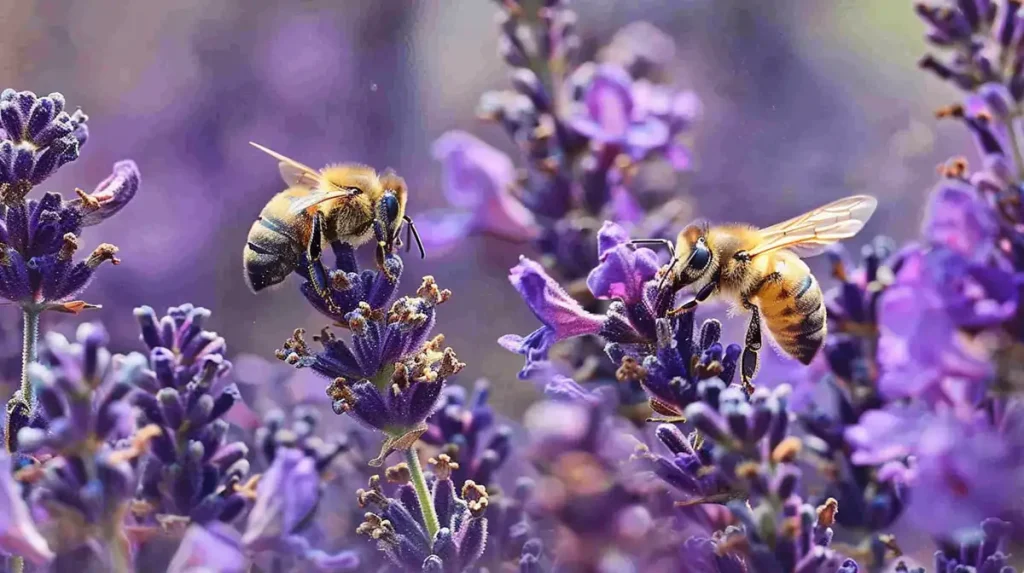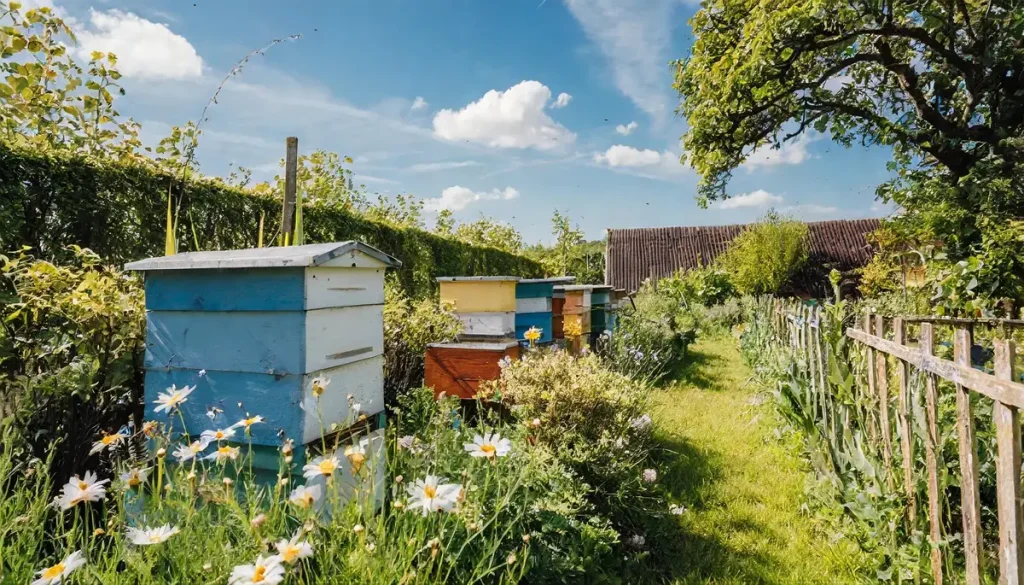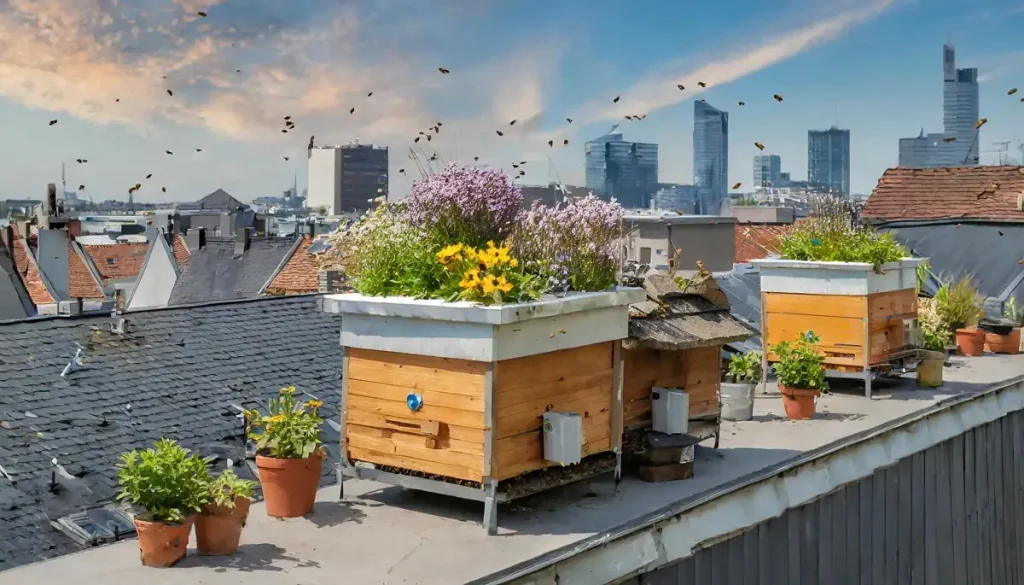Table of Contents
When you think of beekeeping at any scale, what do you imagine a typical operation would look like? It is probably safe to say that most of us imagine something akin to a massive agricultural operation or a fairly expansive set up in a rural or suburban area. While all of that certainly is reasonable, urban beekeeping is also a reality.
Beekeepers do not live only in the country and suburban neighborhoods. There are plenty of beekeepers that live in cities of all sizes. And by the way, urban beekeeping isn’t confined just to North America and Europe. Cities across the world are home to beekeepers, both professional and amateur alike.
The point of this article is to demonstrate that urban beekeeping is not just another way to practice the beekeeping hobby. It is actually critically important to the survival of honeybees. Urban beekeeping is just as important as large-scale beekeeping operations in rural areas. Keep reading to find out why.
1. Bee Populations Are Still at Risk
I tend to mention in every article I write that bee populations have been in decline for more than a decade. This is not simply to take up space on a page. I mention it because it is a stark reality few people seem to grasp. Bee populations around the world have suffered, and are continuing to suffer, from colony collapse disorder (CCD).
Have you ever contacted a pest control company for help dealing with a beehive on your property? If so, perhaps you noticed that the contractor did not destroy the hive. Instead, it was simply moved to a different location. Why is that?
Pest controllers no longer destroy honeybee hives unless these pose a very real danger to people or animals. Otherwise, hives will be moved. This is because pest controllers are doing their best not to reduce bee populations any further.
Likewise, urban beekeeping is important because it contributes to the efforts to increase bee populations. It’s sort of like that old adage that says, ‘every little bit helps’. Every urban beekeeper capable of managing at least one hive is another helping to rebuild decimated bee populations. And as long as CCD continues to be a problem, we need as many beekeepers as we can get – urban and otherwise.

2. We Need an Alternative to Industrial Beekeeping
Beekeeping, like animal husbandry, is very much an industrial practice in many parts of the world. Bees are important partners in large-scale agriculture due to their nature as pollinators. So in order to keep industrial agricultural moving, operators need industrial beekeeping.
What does this mean? It means large-scale operations with hundreds of hives all stacked on top of one another. The bees are fed sugar water instead of natural food as a means of saving money. Those bees are shipped from one location to another so as to pollinate large, industrial size fields.
Simply put, this type of environment is not natural for bees. As such, there are some experts who believe industrialization is contributing to CCD. And even if it is not, industrialized bees are not as robust and healthy as those that live more natural lives.
Here’s where urban beekeeping comes into play. Believe it or not, an urban environment offers a more natural setting for bees than an industrial one. Urban beekeeping still allows bees to go out and find their own sources of pollen. They come back to the nest to feed, thus producing the honey we all love.
Urban bees also tend to be more naturally robust than their industrialized counterparts due to the reality that they have to adapt to different conditions. Their lives are not so tightly controlled as to protect them from anything that could harm them. And that leads to the next point.
- Carter, Anthony (Author)
- English (Publication Language)
- 194 Pages - 02/28/2024 (Publication Date) - Independently published (Publisher)
3. Bees Need Improved Adaptability
No one really knows for sure what causes CCD. However, it has been suggested that one of the ways to solve the problem is to increase bee adaptability. This thinking is based on the concepts of evolution and natural selection.
Bees are naturally adaptive creatures. They can adapt to a variety of weather conditions, extreme temperature fluctuations, and even exposure to certain kinds of environments that are not natural to them. That’s why Africanized bees seem to do so well. They have adapted.
The challenge with beekeeping in a controlled rural environment is making sure that bees are exposed to just enough potential harm to cause them to adapt. If bee populations are never forced to adapt, they never will. The end result will be fewer and fewer numbers due to colonies not being able to handle changing environments.
The urban environment is perfect for encouraging greater adaptability. Unlike rural environments, urban environments change at a much more rapid pace. It is a natural result of so much human activity. If we can integrate more bees into those environments, we can encourage better adaptability, which should ultimately result in more robust populations.
4. Urban Environments Require Pollinating
Do you live in an urban environment? If so, step back and think about the flowers, plants, and trees you see in your local area. We need urban beekeeping because those flowers, plants, and trees require pollination just as much as their suburban and rural counterparts.
Spend the day walking through London, for example, and you will discover dozens of public parks alive with green grass and beautiful flowers. Bees are partly responsible for that. Likewise, ride a bike through the center of Cape Town, South Africa and you’ll notice natural foliage that only lives because bees pollinate.
The take-away here is that pollination is a normal part of the life cycle. It doesn’t cease to exist in an urban environment just because a lot of the vegetation has been replaced by asphalt and concrete. Whatever vegetation remains still needs the help of bees to survive.
5. Amateurs Are Doing Most of the Work
Among the 100 million or so beehives scattered around the world, the largest share of them are run by amateur beekeepers who do what they do as a hobby. The fact of the matter is that amateurs are doing most of the work in keeping bee numbers stable.
What does that have to do with urban beekeeping? A lot. Think of the concept of safety in numbers. If we are to restore bee populations to their normal levels, we need as many beekeepers as possible doing what they do. And where you find more people, you have the possibility of encouraging more people to take up beekeeping.
Our urban centers are home to far more people than the countryside. There are far more people living in cities than on country lanes. So it stands to reason that recruiting new beekeepers should concentrate on urban areas first. That is where the numbers are.

If it helps, think in terms of percentages. Let’s say that a nationwide beekeeping organization engages in an aggressive recruiting effort that they believe will create a 10% return. In other words, 10 new beekeepers will take up the hobby for every 100 people reached.
Now, go visit a city like New York, with a population of 8.6 million. A 10% return rate would mean 860,000 new beekeepers recruited. Then visit a rural area in New Zealand with a population of 10,000. That same 10% success rate would yield 1,000 new beekeepers. Get the point?
We realize that a 10% return rate is probably not realistic in any way, shape, or form, but it makes for easy-to-understand numbers. The point is that denser urban populations mean more potential recruits.
6. The Numbers Add Up
We can further extend this idea of recruiting new beekeepers to offer yet another reason why urban beekeeping is so important: the numbers add up. Are you familiar with the Benjamin Franklin quote that says, “a penny saved is a penny earned?” It’s the same thing.
Let’s just say you have 100 urban beekeepers in every major city across the world. Compared to the populations of those urban centers, 100 isn’t a whole lot. But when you add the contributions of all those beekeepers together, that’s quite another matter.
Tens of thousands of small urban beekeepers still add up to more productivity than one or two large-scale operations. We already know that amateurs are doing most of the work, and this idea of the numbers adding up is simply an extension of that. More urban beekeepers mean more dedicated people rebuilding bee populations. In the end, it all adds up to success.
6. Beekeeping Is Dying
One last reason that urban beekeeping is so important lies in the fact that the hobby itself is slowly dying. The majority of active beekeepers are now past middle age, leading to the inevitable fact that many of them will be retiring and passing on within the next couple of decades. There are not enough younger hobbyists getting into beekeeping to take their place.
Promoting urban beekeeping could be a big part of the solution. Again, think of urban populations. There are a lot more young people living in our cities than there are in rural environments. Furthermore, today’s kids need something to do other than staring at screens and playing video games.
An aggressive push in urban areas could get more young people interested in beekeeping as a hobby. That would definitely be a good thing. The more young people we can successfully recruit, the greater the chances that we will be able to replace those older beekeepers who will eventually fade into the sunset.
Environmental Benefits of Urban Beekeeping – The Conclusion
I can wrap all this up by saying that urban beekeeping is important if we don’t want the hobby to die, and the bees along with it. And as I’ve demonstrated in other posts, we certainly can’t afford to lose our bees. They play a critical role in the cycle of life that just cannot be replicated any other way. And as this post has demonstrated, the environmental benefits or urban beekeeping are many and varied.
In the meantime, I encourage you to learn more about the beekeeping hobby. It is a rather fascinating hobby that involves physical activity, education, observation, and so much more. It is also a very relaxing hobby for people with the right mindset.
There is no way for me to know if you would succeed as an urban beekeeper. But I do know that the only way to figure it out is to try. Trying starts with education and research. So avail yourself of every resource you can find. If beekeeping intrigues you, give it a shot. You might turn out to be the best beekeeper in your area.
Looking to up your beekeeping game? Check out our latest product recommendations so you can take things to the next level!
Introducing The Top 12 Best Beekeeping Veils For 2024
Introducing The Top 20 Best Beekeeping Gloves For 2024
Introducing The Absolute Best Beekeeping Suits For 2024
The 15 Top Beekeeping Books for 2024
The Top 11 Honey Extractors for 2024
The Top 12 Mason Bee Houses for 2024
Beekeeping Disclaimer:
Beekeeping, like any agricultural activity, involves inherent risks. It is important to understand these risks and take appropriate measures to mitigate them.
Potential risks associated with beekeeping include:
- Bee stings: Honey bees are generally not aggressive but can become defensive if they feel threatened or their hive is disturbed. Bee stings can cause allergic reactions or even anaphylaxis in some individuals, which can be life-threatening. It is important to wear protective clothing and follow best practices when handling bees to minimize the risk of stings.
- Diseases and pests: Bees can be vulnerable to various diseases and pests, including mites, viruses, and bacterial infections. These can have significant impacts on bee colonies, leading to reduced honey production or even colony collapse. It is important to monitor hives regularly and take appropriate measures to prevent and treat diseases and pests.
- Weather conditions: Extreme weather conditions, such as drought or cold temperatures, can affect the health and productivity of bee colonies. It is important to ensure that hives are appropriately sheltered and provided with adequate food and water.
- Environmental hazards: Bees can be affected by environmental hazards such as pesticide exposure, pollution, and habitat loss. It is important to be aware of these hazards and take appropriate measures to protect bee colonies and promote healthy environments for bees.
- Legal requirements: Beekeeping may be subject to local, state, or national regulations, such as registration or inspection requirements. It is important to be aware of these requirements and comply with them.
While beekeeping can be a rewarding and enjoyable activity, it is important to be aware of the potential risks and take appropriate measures to mitigate them. By following best practices and staying informed about the latest developments in beekeeping, beekeepers can help ensure the health and productivity of their hives and contribute to the well-being of bee populations worldwide.
Last update on 2024-04-17 / Affiliate links / Images from Amazon Product Advertising API


